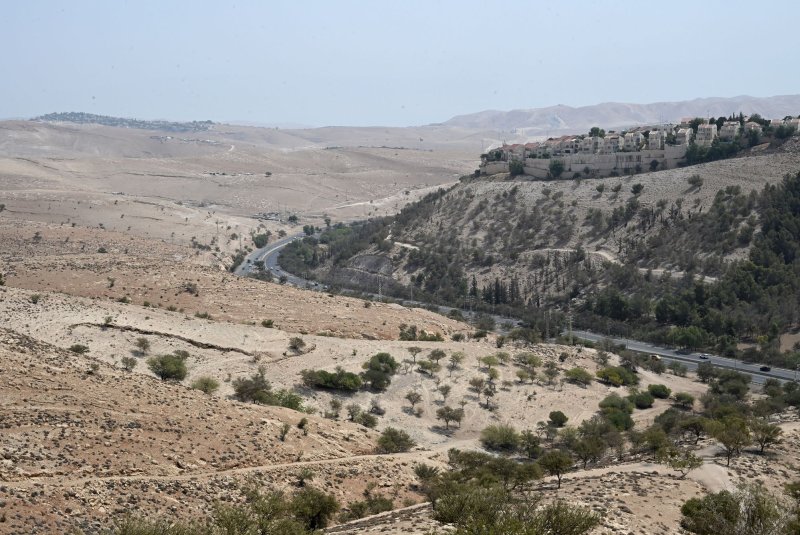Oct. 22 (UPI) — Israel’s Knesset on Wednesday, in a preliminary vote, approved sovereignty in the West Bank for Israel, described as a political ploy by the right-wing opposition during U.S. Vice President JD Vance’s visit to the nation.
President Donald Trump said last month that he will not allow Israel to annex the West Bank.
The bill, which is called “Application of Israeli Sovereignty in Judea and Samaria, 2025,” passed 25-24 by the parliament, and was transferred to the Knesset’s Foreign Affairs and Defense Committee. It must still pass three additional votes in the plenum session.
The legislation says that “the laws, judicial system, administration, and sovereignty of the State of Israel shall apply to all areas of settlement in Judea and Samaria.”
A more limited annexation bill passed 32-9, also in a preliminary reading. The bill applies sovereignty to the West Bank settlement of Ma’ale Adumim near Jerusalem.
Smoke billows from the Nur Shams refugee camp in Tulkarem during an Israeli army operation in the north of the occupied West Bank, on August 29, 2024. File Photo by Ismael Ahmad/UPI
Militant Hamas, which controls the Gaza Strip and not the West Bank, said in a statement that the recent bill “reflects the ugly face of the colonial occupation.”
As a “flagrant violation of all relevant international laws and resolution,” Hamas said Israel “insists on continuing its attempts to ‘legitimize’ settlements and impose Zionist ‘sovereignty’ over the occupied Palestinian territories.”
In 2007, the Palestinian territories were split into two separate administrations.
Israel maintains military control of the 2,263 square miles of the West Bank, while the Palestinian Authority, led by the Fatah party, has jurisdiction over civil and security authority in specific zones, based on the 1995 Oslo Accords.
The West Bank has been divided into three zones.
Area C, which makes up about 60% the West Bank, is under full Israeli military and civilian control. Area C includes agricultural land, water springs, quarries and land for future infrastructure for Israelis.
In August, Israel approved final plans for a settlement project in E1 of Area C between East Jerusalem and the Ma’ale Adumim settlement. This arrangement would sever the West Bank for a contiguous Palestinian State, which Israel opposes as a two-state solution.
More than 500,000 Israeli settlers live in the West Bank out of the total population of 4 million.
Israel annexed East Jerusalem in 1980 and applies its civil law there, though the international community does not recognize this annexation. About 500,000 Israelis live there.
“By applying sovereignty to Judea and Samaria, we are correcting a historical wrong that is long overdue,” Avi Maoz, head of the far-right Noam party, said. “Since the government has hesitated, it is our duty as members of Knesset to act.”
All but one Likud minister boycotted the vote, with Yuli Edelstein breaking ranks to cast a decisive vote. Likud then removed Edelstein from his seat on the Knesset Foreign Affairs and Defense Committee, a spokesperson for the lawmaker confirmed to The Times of Israel.
Maoz denied a request by Prime Minister Benjamin Netanyahu to delay the vote.
Netanyahu’s Likud party said the vote was an attempt to embarrass the government while U.S. Vice President JD Vance visited the country.
“We strengthen settlements every day with actions, budgets, construction, industry, and not with words,” the Times of Israel reported by Likud. “True sovereignty will be achieved not with a show-off law for the protocol, but by working properly on the ground and creating the political conditions appropriate for the recognition of our sovereignty, as was done in the Golan Heights and in Jerusalem.”
The United Arab Emirates said in September that annexation of the West Bank would severely undermine the spirit of the Abraham Accords.
The West Bank was captured during the Six-Day War in 1967, except for East Jerusalem, as a “temporary belligerent occupation.”
The historic city of Bethlehem is in the West Bank and is under Israeli occupation. It has historic ties to the Jewish religion, as well as to Christianity and Islam.
In 2024, the International Court of Justice in The Hague issued an advisory opinion that Israel’s presence in the West Bank was unlawful under international law because it is no longer temporary.

